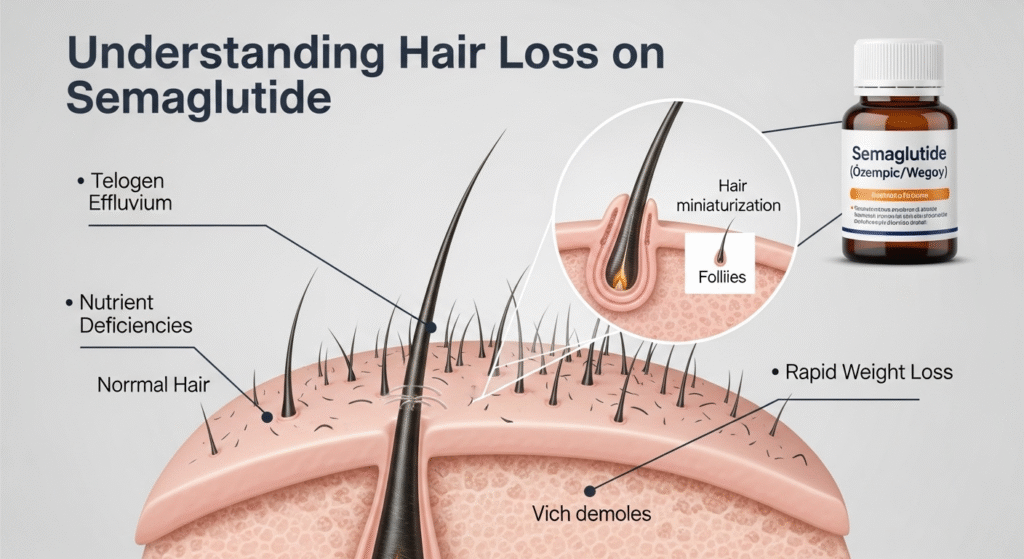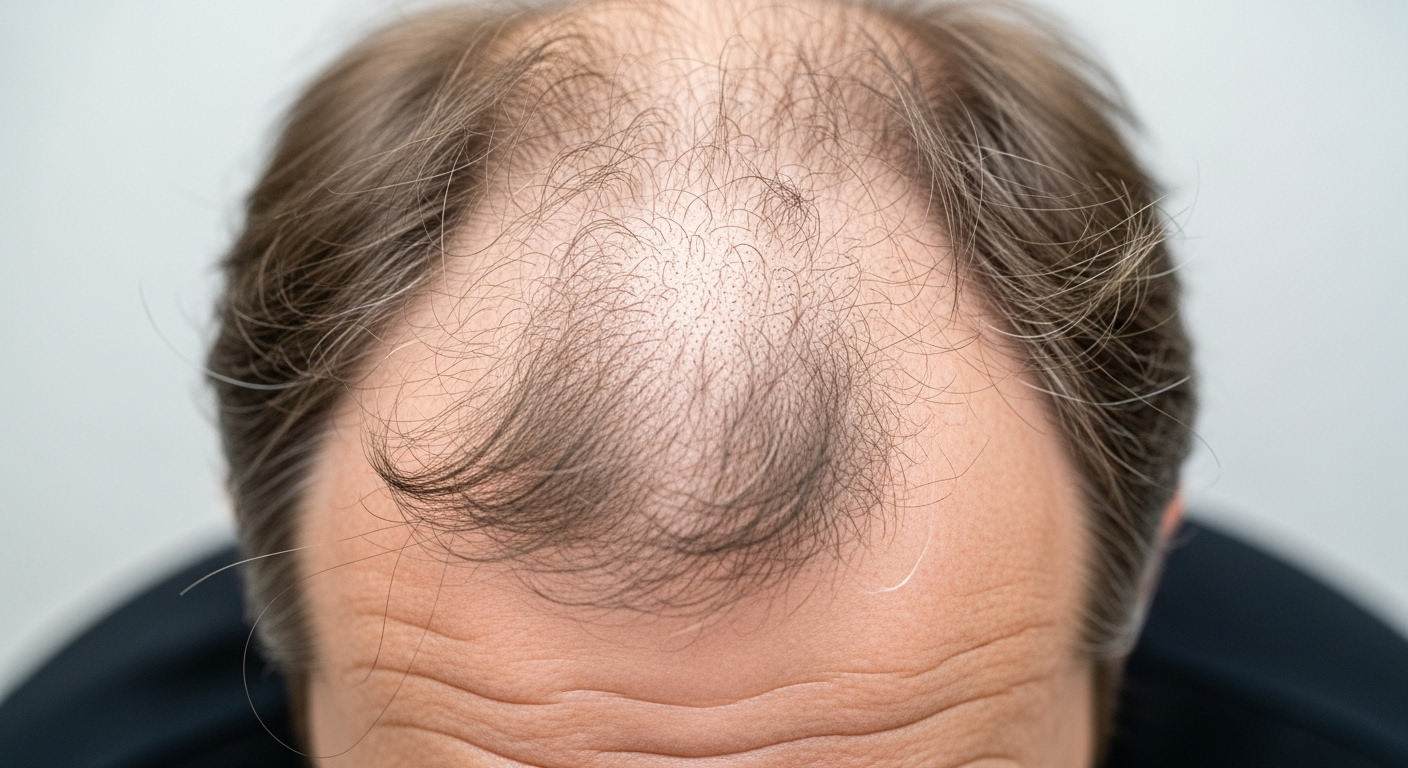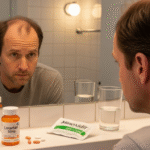If you're using semaglutide medications like Ozempic, Wegovy, or Mounjaro for weight loss or diabetes management, you may have noticed an unfortunate side effect: hair loss. While semaglutide itself isn't directly linked to hair loss, rapid weight loss and the subsequent nutritional deficiencies can cause shedding. Many individuals experience telogen effluvium, a condition where hair …
If you’re using semaglutide medications like Ozempic, Wegovy, or Mounjaro for weight loss or diabetes management, you may have noticed an unfortunate side effect: hair loss. While semaglutide itself isn’t directly linked to hair loss, rapid weight loss and the subsequent nutritional deficiencies can cause shedding. Many individuals experience telogen effluvium, a condition where hair enters the shedding phase prematurely due to stress, hormone changes, or nutritional imbalance.
If you’re concerned about how to stop hair loss while on semaglutide, this article will provide expert-backed strategies for managing shedding and promoting hair regrowth. From proper nutrition to topical treatments and stress management, we’ll cover all the essential tips you need to support your hair health during treatment.

Understanding Hair Loss on Semaglutide
Why Does Hair Loss Occur on Semaglutide?
Semaglutide works by suppressing appetite and slowing down gastric emptying, which leads to reduced calorie intake. This process is highly effective for weight loss and managing diabetes. However, rapid weight loss can cause several physiological changes in the body, including hair loss. The shedding usually happens because of telogen effluvium, a temporary condition where a larger number of hair follicles enter the resting phase (telogen) at once, leading to increased shedding.
Hair loss can also occur due to nutritional deficiencies. Since semaglutide reduces appetite and food intake, patients often struggle to maintain balanced nutrition, which is crucial for healthy hair. Deficiencies in protein, iron, zinc, and vitamins such as biotin, Vitamin D, and B12 can weaken hair follicles and impair the hair growth cycle.
While these issues typically result in temporary hair shedding, taking proactive steps can help mitigate this issue and support healthy hair regrowth.
The Link Between Rapid Weight Loss and Hair Shedding
Rapid weight loss places significant stress on the body, and the body reacts by pushing a larger percentage of hair follicles into the shedding phase. This is a normal process, but when it happens suddenly, the results can be more noticeable. Since semaglutide works by promoting rapid weight loss, your body may not have enough time to adjust to the new diet, leading to hair thinning or shedding.
In most cases, hair regrowth begins within 3-6 months after the shedding phase. With the right care, however, you can reduce the duration of shedding and support the regrowth process.
Expert Tips to Stop Hair Loss on Semaglutide

1. Prioritize Protein Intake
Protein is essential for hair health. Hair is primarily made of keratin, a protein, and when your body lacks enough protein, hair follicles may become weak and fall out more easily. Since semaglutide reduces appetite, it’s easy to fall short of your daily protein needs. Aim to consume at least 60 grams of protein per day to support hair health and maintain your body’s overall well-being.
Protein-Rich Foods for Hair Health
Here are some excellent sources of protein that will help maintain strong, healthy hair:
- Lean meats (chicken, turkey, lean beef)
- Fish (salmon, mackerel, sardines)
- Eggs (high in biotin and protein)
- Dairy (Greek yogurt, cottage cheese, milk)
- Legumes (lentils, beans, chickpeas)
- Plant-based proteins (tofu, tempeh, quinoa)
If you find it challenging to meet your protein needs through food alone, consider adding a protein supplement. This can help ensure that you’re getting enough protein to support hair growth and repair.
2. Supplement with Essential Vitamins and Minerals

After starting semaglutide, your body may struggle to absorb or get enough of certain nutrients. Supplementation can fill these gaps, especially when it comes to vitamins and minerals that are critical for hair health.
Key Nutrients for Hair Health
- Biotin (Vitamin B7): Helps with keratin production, leading to stronger hair.
- Vitamin D: Regulates hair follicle cycling and promotes regrowth.
- Iron: Essential for oxygenating hair follicles and preventing hair loss.
- Zinc: Plays a role in hair tissue growth and repair.
- Vitamin B12: Supports red blood cell production and hair follicle nourishment.
Supplement Recommendations
- Biotin: 30–100 mcg per day.
- Iron: Check levels with a doctor to determine proper dosage.
- Zinc: 15–30 mg per day.
- Vitamin D: 600–800 IU per day (depending on blood levels).
- Vitamin B12: 2.4 mcg per day.
Always consult your healthcare provider before starting any new supplementation, as the appropriate dosages will depend on your specific health profile.
3. Stay Hydrated
Hydration is often overlooked when it comes to hair health. Dehydration can lead to dry, brittle hair, making it more prone to breakage. Drinking enough water also supports the overall health of your scalp, which is essential for hair growth.
Aim for at least 64 ounces (2 liters) of water daily. Adding electrolyte-rich drinks like coconut water can help maintain hydration balance in your body, further supporting healthy hair growth.
4. Manage Stress
Stress is a common trigger for hair loss, especially in the form of telogen effluvium. Stress can disrupt the hair growth cycle, pushing more hair follicles into the resting phase. While stress is a common challenge when undergoing a lifestyle change like weight loss, managing it effectively can significantly reduce hair shedding.
Stress-Reduction Techniques
- Meditation: Practicing mindfulness meditation for 10–20 minutes a day can help reduce stress hormones and promote hair health.
- Exercise: Regular physical activity can increase blood circulation, delivering more nutrients to the scalp and hair follicles.
- Deep breathing exercises: Techniques such as pranayama (yoga breathwork) can calm the nervous system and reduce stress levels.
- Adequate sleep: Aim for 7–8 hours of quality sleep each night to allow your body to regenerate and repair.
5. Gentle Hair Care Practices
Hair care plays a crucial role in minimizing hair shedding. While you’re on semaglutide, your hair may be more fragile than usual, so adopting gentle hair care practices can help prevent further breakage.
Tips for Healthy Hair Care
- Use sulfate-free shampoo: Sulfates can strip your hair of essential oils, leading to dryness and breakage. Opt for shampoos that are gentle on your hair and scalp.
- Avoid excessive heat styling: Heat tools like blow dryers, straighteners, and curling irons can weaken hair strands. If you must use them, always apply a heat protectant.
- Use a wide-toothed comb: Instead of a brush, use a wide-toothed comb to gently detangle your hair to avoid unnecessary breakage.
- Limit tight hairstyles: Styles like ponytails or braids that put tension on your hair can lead to traction alopecia. Opt for loose hairstyles to minimize damage.
6. Consider Topical Treatments
Topical treatments, like minoxidil, can help stimulate hair regrowth. This over-the-counter solution has been shown to improve the hair growth cycle in individuals with thinning hair. Before using any topical treatment, it’s crucial to consult with a dermatologist to ensure it’s the right fit for your situation.
Minoxidil typically needs to be applied directly to the scalp twice daily for several months before seeing results. It’s important to remain patient and consistent with your application.
7. Explore Advanced Therapies
If hair loss persists or is particularly concerning, advanced therapies such as Platelet-Rich Plasma (PRP) therapy or low-level laser therapy (LLLT) may be an option. PRP therapy involves injecting your own platelet-rich plasma into the scalp to stimulate hair growth. Similarly, LLLT uses light therapy to enhance follicle activity.
Both of these treatments can be discussed with a dermatologist or hair restoration specialist to determine their suitability for your hair loss condition.
When to Seek Professional Help
If you notice persistent or worsening hair loss while on semaglutide, it’s time to consult with a dermatologist or trichologist. They can evaluate your condition and offer additional treatments or guidance on managing hair loss. Additionally, they may run tests to check for nutritional deficiencies, hormonal imbalances, or other underlying conditions that could be contributing to the shedding.
FAQ
1. Is hair loss from semaglutide permanent?
No, hair loss associated with semaglutide is generally temporary. With the right care and supplementation, most people will experience hair regrowth within 6 to 12 months.
2. Can I continue using semaglutide if I am experiencing hair loss?
Yes, you can continue using semaglutide. However, if the hair loss is significant or persistent, speak to your doctor to address any underlying issues and adjust your treatment plan.
3. What can I do if hair loss continues after 6 months?
If hair loss continues after 6 months, consult with a healthcare provider or dermatologist. They can help identify if an underlying condition, such as a nutritional deficiency, is contributing to the shedding.
4. Should I use hair growth treatments like minoxidil while on semaglutide?
Yes, minoxidil can be used to promote hair regrowth, but always consult with your healthcare provider before starting any new treatments to ensure they are safe and effective for your specific condition.
5. Will my hair grow back to its original thickness?
Hair regrowth can vary from person to person. Many individuals experience a return to their baseline hair density, but some may notice slight differences.
Conclusion
Experiencing hair loss while using semaglutide can be an unsettling side effect, but with the right strategies, it can be managed effectively. By focusing on nutrition, stress management, and gentle hair care, you can reduce shedding and support healthy hair regrowth. If hair loss continues or becomes severe, it’s important to consult with a professional to determine the best course of action for your hair health.
If you’re struggling with hair loss while using semaglutide, book a consultation with Dr. Uzma Irfan, an ISHRS-certified surgeon in Islamabad today. We’ll help you develop a personalized plan to manage hair loss and restore your hair health.






